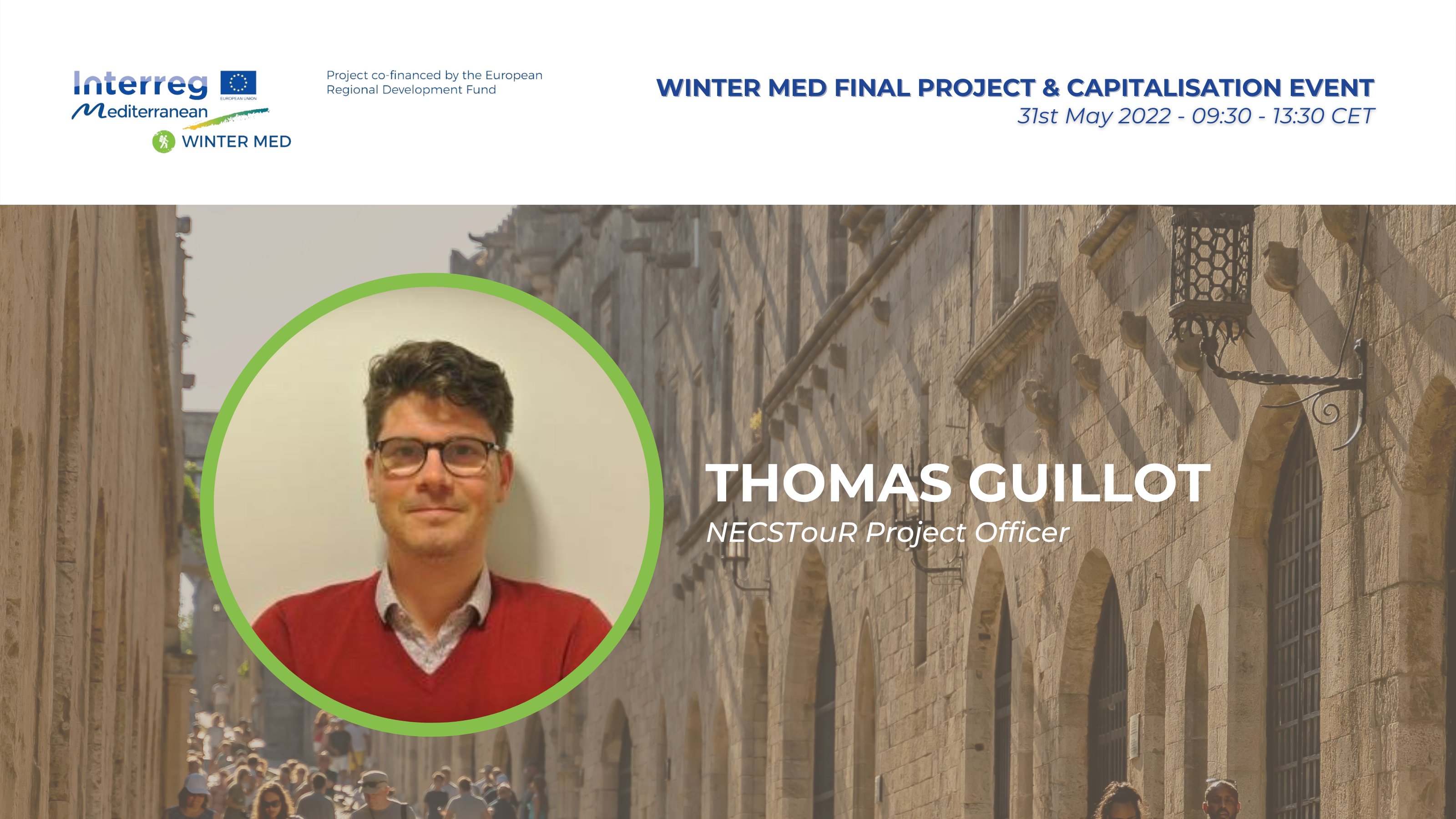
NECSTouR supports WINTERMED Policy Recommendations for Better Cooperation in the MED
-
31/05/2022
As WINTERMED’s associated partner and their horizontal angel in the Interreg MED Sustainable Tourism community, NECSTouR was invited to take part in the policy section of WINTERMED Final and Capitalisation Event, an hybrid event held in Rhodes, Greece on May 31st. The theme was "Shared vision and commitment to year-round sustainable tourism in Mediterranean island destinations and beyond", the policy section included the participation of Josiane Cutajar (MEP) and Valentina Superti (European Commission).
The aim of this event was to present the main results of the project as well as to invite key high-level actors outside the partnership to exchange views and react to the WINTER MED Policy Paper and its main recommendations. Thomas Guillot, project officer of NECSTouR, chose to comment on their 8th recommendation, where it said to “encourage necessary improvements for the sector in terms of”:
Cooperation
Recognising more specifically:
- The limited visibility of the territories towards the high decision-making level
- The scarce coordination and limited actions among Mediterranean islands in relation to effective solutions to address seasonality issues, in particular, among tourism actors, and the limited integration of policies across governance levels and sectors, which usually results into a slow and inefficient reaction to emergency situations and crisis.
Better consideration of territorial needs/challenges at national and European policy-making
- considering more specifically: the important role of local & regional actors, best placed to advocate for the different territorial needs, leading to the risk of not matching those needs with EU funding & objectives related to tourism;
In the Sustainable Tourism project, NECSTouR is working on the Sustainable Tourism Handbook on How to use EU recovery funds and ERDF 2021-2027 for sustainable tourism in the Mediterranean region.
The Handbook will inform public authorities and tourism stakeholders in the Mediterranean about funding opportunities for projects contributing to sustainable tourism using two of the most important EU funding instruments, the Recovery and Resilience Facility (RRF) and the European Regional Development Fund (ERDF). This handbook addresses public authorities involved in the programming and implementation of RRF and ERDF programmes as well as stakeholders that are part of the tourism ecosystem and want to invest in sustainable tourism.
This work is strongly supported by the European Commission, particularly DG GROW and DG REGIO. The final document is expected for the summer.
Consideration of local communities
with a focus on:
- Steering synergies with other economic sectors, so that population increase in the islands thanks to a diversified economy can be a reality;
- Fostering the attractiveness of territories for domestic visitors, supporting proximity-based tourism - a current trend emerged because of the pandemic and travel restrictions imposed, improving social inclusion by making tourism accessible also for the most vulnerable groups;
- Promoting community engagement in local decision-making linked to the development of tourism, strengthening/diversifying local supply chains, so that local residents contribute to and benefit from new opportunities offered by the sector, while avoiding gentrification of destinations, providing affordable housing, lowering negative impacts of noise/traffic/air and light pollution, and environmental and land degradation;
Since 2019, NECSTouR is promoting that “Better Places to Live” are indeed “Better Places to Visit” through the Barcelona Declaration. It seeks to demonstrate what tourism and cultural heritage sectors can achieve by working more closely together, for the benefit of European citizens and cultural heritage as well as businesses, visitors, and destinations. Moreover, it assumes the collective commitment of both sectors towards the Sustainable Development Goals (SDGs).
NECSTouR alkso considered commenting on the 4th recommendation of the WINTERMED Policy Paper:
Support the role of Regions in
- helping monitor/manage data about seasonality/tourism flows, considering coastal/inland/urban interactions;
- developing integrated strategies and cooperation projects, fostering enhanced cooperation between public and private actors;
- influencing with their knowledge/data coming from the ground, the development of tourism policies and more broadly sea-basin/macro-regional strategies;
NECSTouR is an example of destinations cooperating and competing at the same time. "We are a group of regions (with competing interests) organized as a network and cooperate in order to achieve common goals" said Thomas Guillot. Knowledge transfer is a clear beneficial cooperation among regions and destinations. We have been involved directly or indirectly in many projects about the use of data to monitor tourism flows, to decrease seasonality effects… We were partner in MITOMED+, associated partner in HERIT DATA and we have launched our own data department: The Tourism of Tomorrow Lab delivers services as a common data department for any destination involved. It’s a space for cooperative competition. A place where DMOs and destinations can find answers to questions, and even, a place where the right questions are proposed.
WINTERMED Transational Year-Round Strategy
WINTER MED is the Interreg MED project on Winter Islands Network for all year round Tourism ExpeRience in the MEDiterranean and counts a number of NECSTouR regions and members within its rank (Tuscany, Baleares, IPTPO). NECSTouR is an associated partner in the consortium as well as the Horizontal Angel for the project within the Interreg MED Sustainable Tourism community. CPMR and NECSTouR share a Memorandum of Understanding.
In addition of their policy recommendations, WINTERMED recently delivered of a Transnational Year-Round Tourism Strategy for Mediterranean Island Destinations 2021-2026, one of the most important keystones of the project. Learn more about it here.